Employability Skills Report: HR Manager Role at Travelodge Hotel
VerifiedAdded on 2021/01/02
|26
|8532
|44
Report
AI Summary
This report examines the employability skills required for an HR manager role at Travelodge. It begins by outlining the HR manager's responsibilities and performance objectives, emphasizing personal responsibilities, time management, communication, and interpersonal skills. The report then assesses the HR manager's effectiveness against these objectives, using a traffic light skill audit to identify areas for improvement, particularly in technical skills and emotional intelligence. Recommendations for improvement are provided, including suggestions for enhancing technical skills and communication. The report further explores motivational techniques, including Maslow's hierarchy of needs and Herzberg's two-factor theory, to improve employee performance and satisfaction. The report also covers developing solutions to work-based problems, effective time management strategies, analysis of team dynamics, and alternative approaches to task completion to achieve team goals. Finally, it addresses tools and methods for problem-solving and strategies for resolving labor turnover, including the potential impact of implemented strategies on the business.
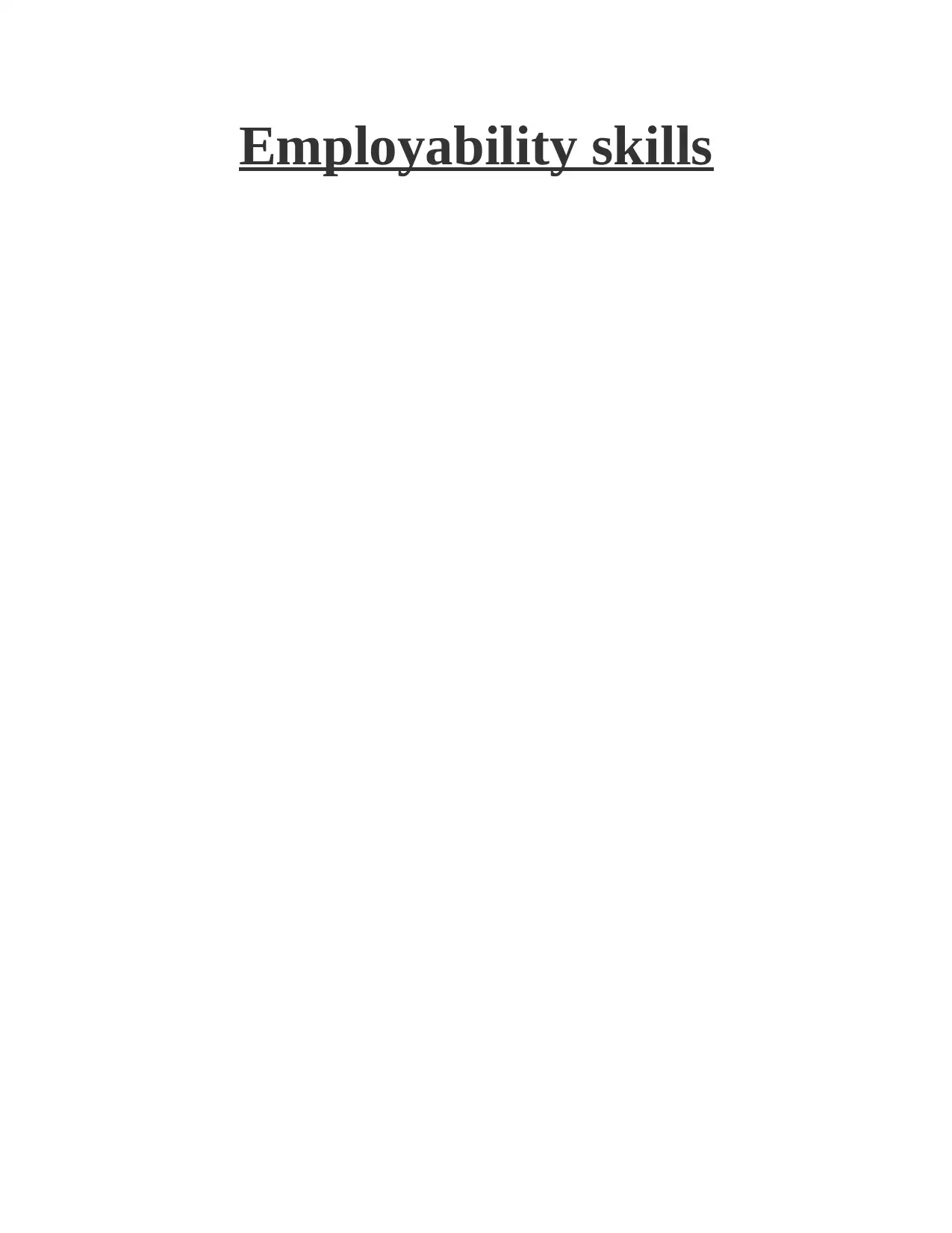
Employability skills
Paraphrase This Document
Need a fresh take? Get an instant paraphrase of this document with our AI Paraphraser
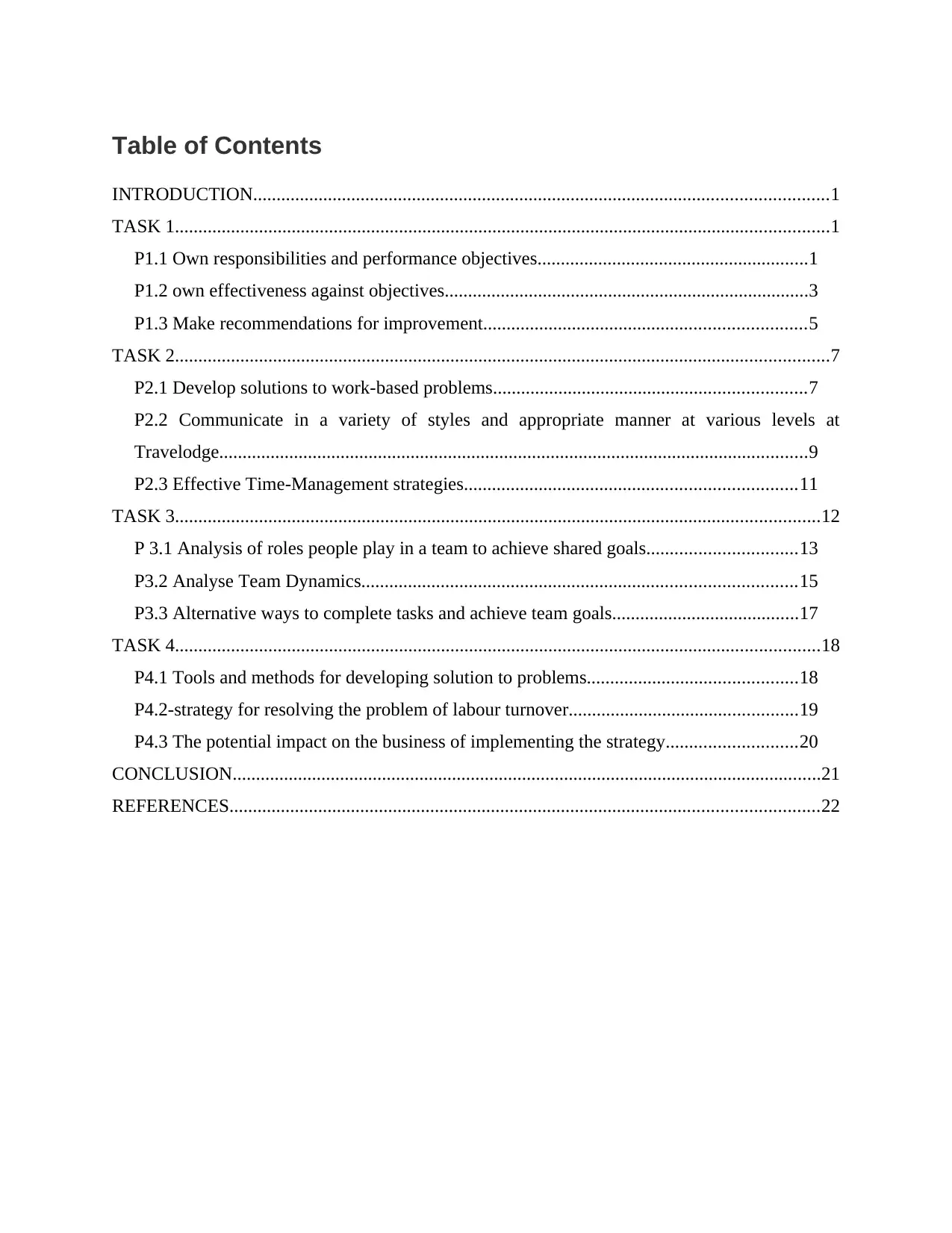
Table of Contents
INTRODUCTION...........................................................................................................................1
TASK 1............................................................................................................................................1
P1.1 Own responsibilities and performance objectives..........................................................1
P1.2 own effectiveness against objectives..............................................................................3
P1.3 Make recommendations for improvement.....................................................................5
TASK 2............................................................................................................................................7
P2.1 Develop solutions to work-based problems...................................................................7
P2.2 Communicate in a variety of styles and appropriate manner at various levels at
Travelodge..............................................................................................................................9
P2.3 Effective Time-Management strategies.......................................................................11
TASK 3..........................................................................................................................................12
P 3.1 Analysis of roles people play in a team to achieve shared goals................................13
P3.2 Analyse Team Dynamics.............................................................................................15
P3.3 Alternative ways to complete tasks and achieve team goals........................................17
TASK 4..........................................................................................................................................18
P4.1 Tools and methods for developing solution to problems.............................................18
P4.2-strategy for resolving the problem of labour turnover.................................................19
P4.3 The potential impact on the business of implementing the strategy............................20
CONCLUSION..............................................................................................................................21
REFERENCES..............................................................................................................................22
INTRODUCTION...........................................................................................................................1
TASK 1............................................................................................................................................1
P1.1 Own responsibilities and performance objectives..........................................................1
P1.2 own effectiveness against objectives..............................................................................3
P1.3 Make recommendations for improvement.....................................................................5
TASK 2............................................................................................................................................7
P2.1 Develop solutions to work-based problems...................................................................7
P2.2 Communicate in a variety of styles and appropriate manner at various levels at
Travelodge..............................................................................................................................9
P2.3 Effective Time-Management strategies.......................................................................11
TASK 3..........................................................................................................................................12
P 3.1 Analysis of roles people play in a team to achieve shared goals................................13
P3.2 Analyse Team Dynamics.............................................................................................15
P3.3 Alternative ways to complete tasks and achieve team goals........................................17
TASK 4..........................................................................................................................................18
P4.1 Tools and methods for developing solution to problems.............................................18
P4.2-strategy for resolving the problem of labour turnover.................................................19
P4.3 The potential impact on the business of implementing the strategy............................20
CONCLUSION..............................................................................................................................21
REFERENCES..............................................................................................................................22
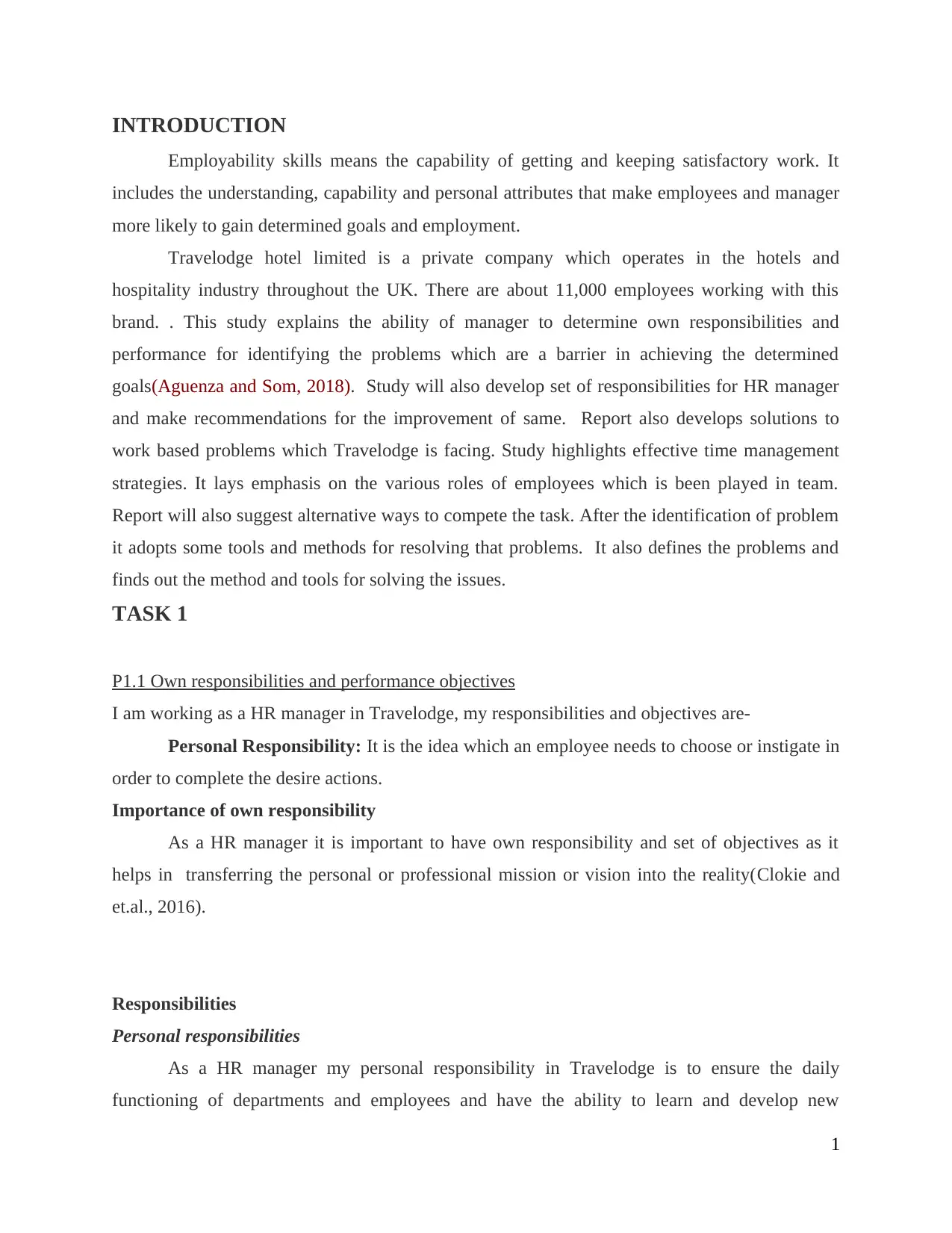
INTRODUCTION
Employability skills means the capability of getting and keeping satisfactory work. It
includes the understanding, capability and personal attributes that make employees and manager
more likely to gain determined goals and employment.
Travelodge hotel limited is a private company which operates in the hotels and
hospitality industry throughout the UK. There are about 11,000 employees working with this
brand. . This study explains the ability of manager to determine own responsibilities and
performance for identifying the problems which are a barrier in achieving the determined
goals(Aguenza and Som, 2018). Study will also develop set of responsibilities for HR manager
and make recommendations for the improvement of same. Report also develops solutions to
work based problems which Travelodge is facing. Study highlights effective time management
strategies. It lays emphasis on the various roles of employees which is been played in team.
Report will also suggest alternative ways to compete the task. After the identification of problem
it adopts some tools and methods for resolving that problems. It also defines the problems and
finds out the method and tools for solving the issues.
TASK 1
P1.1 Own responsibilities and performance objectives
I am working as a HR manager in Travelodge, my responsibilities and objectives are-
Personal Responsibility: It is the idea which an employee needs to choose or instigate in
order to complete the desire actions.
Importance of own responsibility
As a HR manager it is important to have own responsibility and set of objectives as it
helps in transferring the personal or professional mission or vision into the reality(Clokie and
et.al., 2016).
Responsibilities
Personal responsibilities
As a HR manager my personal responsibility in Travelodge is to ensure the daily
functioning of departments and employees and have the ability to learn and develop new
1
Employability skills means the capability of getting and keeping satisfactory work. It
includes the understanding, capability and personal attributes that make employees and manager
more likely to gain determined goals and employment.
Travelodge hotel limited is a private company which operates in the hotels and
hospitality industry throughout the UK. There are about 11,000 employees working with this
brand. . This study explains the ability of manager to determine own responsibilities and
performance for identifying the problems which are a barrier in achieving the determined
goals(Aguenza and Som, 2018). Study will also develop set of responsibilities for HR manager
and make recommendations for the improvement of same. Report also develops solutions to
work based problems which Travelodge is facing. Study highlights effective time management
strategies. It lays emphasis on the various roles of employees which is been played in team.
Report will also suggest alternative ways to compete the task. After the identification of problem
it adopts some tools and methods for resolving that problems. It also defines the problems and
finds out the method and tools for solving the issues.
TASK 1
P1.1 Own responsibilities and performance objectives
I am working as a HR manager in Travelodge, my responsibilities and objectives are-
Personal Responsibility: It is the idea which an employee needs to choose or instigate in
order to complete the desire actions.
Importance of own responsibility
As a HR manager it is important to have own responsibility and set of objectives as it
helps in transferring the personal or professional mission or vision into the reality(Clokie and
et.al., 2016).
Responsibilities
Personal responsibilities
As a HR manager my personal responsibility in Travelodge is to ensure the daily
functioning of departments and employees and have the ability to learn and develop new
1
⊘ This is a preview!⊘
Do you want full access?
Subscribe today to unlock all pages.

Trusted by 1+ million students worldwide
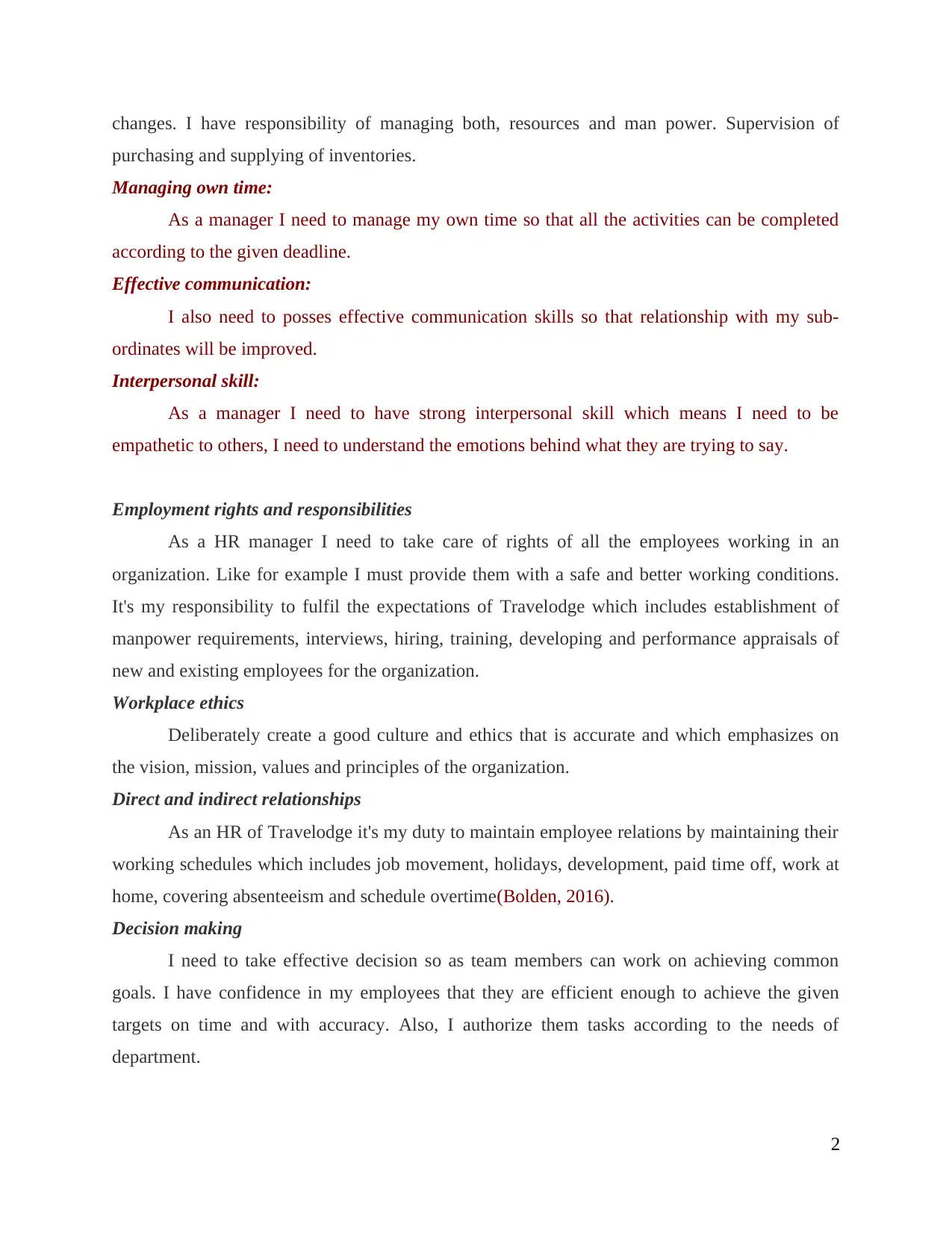
changes. I have responsibility of managing both, resources and man power. Supervision of
purchasing and supplying of inventories.
Managing own time:
As a manager I need to manage my own time so that all the activities can be completed
according to the given deadline.
Effective communication:
I also need to posses effective communication skills so that relationship with my sub-
ordinates will be improved.
Interpersonal skill:
As a manager I need to have strong interpersonal skill which means I need to be
empathetic to others, I need to understand the emotions behind what they are trying to say.
Employment rights and responsibilities
As a HR manager I need to take care of rights of all the employees working in an
organization. Like for example I must provide them with a safe and better working conditions.
It's my responsibility to fulfil the expectations of Travelodge which includes establishment of
manpower requirements, interviews, hiring, training, developing and performance appraisals of
new and existing employees for the organization.
Workplace ethics
Deliberately create a good culture and ethics that is accurate and which emphasizes on
the vision, mission, values and principles of the organization.
Direct and indirect relationships
As an HR of Travelodge it's my duty to maintain employee relations by maintaining their
working schedules which includes job movement, holidays, development, paid time off, work at
home, covering absenteeism and schedule overtime(Bolden, 2016).
Decision making
I need to take effective decision so as team members can work on achieving common
goals. I have confidence in my employees that they are efficient enough to achieve the given
targets on time and with accuracy. Also, I authorize them tasks according to the needs of
department.
2
purchasing and supplying of inventories.
Managing own time:
As a manager I need to manage my own time so that all the activities can be completed
according to the given deadline.
Effective communication:
I also need to posses effective communication skills so that relationship with my sub-
ordinates will be improved.
Interpersonal skill:
As a manager I need to have strong interpersonal skill which means I need to be
empathetic to others, I need to understand the emotions behind what they are trying to say.
Employment rights and responsibilities
As a HR manager I need to take care of rights of all the employees working in an
organization. Like for example I must provide them with a safe and better working conditions.
It's my responsibility to fulfil the expectations of Travelodge which includes establishment of
manpower requirements, interviews, hiring, training, developing and performance appraisals of
new and existing employees for the organization.
Workplace ethics
Deliberately create a good culture and ethics that is accurate and which emphasizes on
the vision, mission, values and principles of the organization.
Direct and indirect relationships
As an HR of Travelodge it's my duty to maintain employee relations by maintaining their
working schedules which includes job movement, holidays, development, paid time off, work at
home, covering absenteeism and schedule overtime(Bolden, 2016).
Decision making
I need to take effective decision so as team members can work on achieving common
goals. I have confidence in my employees that they are efficient enough to achieve the given
targets on time and with accuracy. Also, I authorize them tasks according to the needs of
department.
2
Paraphrase This Document
Need a fresh take? Get an instant paraphrase of this document with our AI Paraphraser
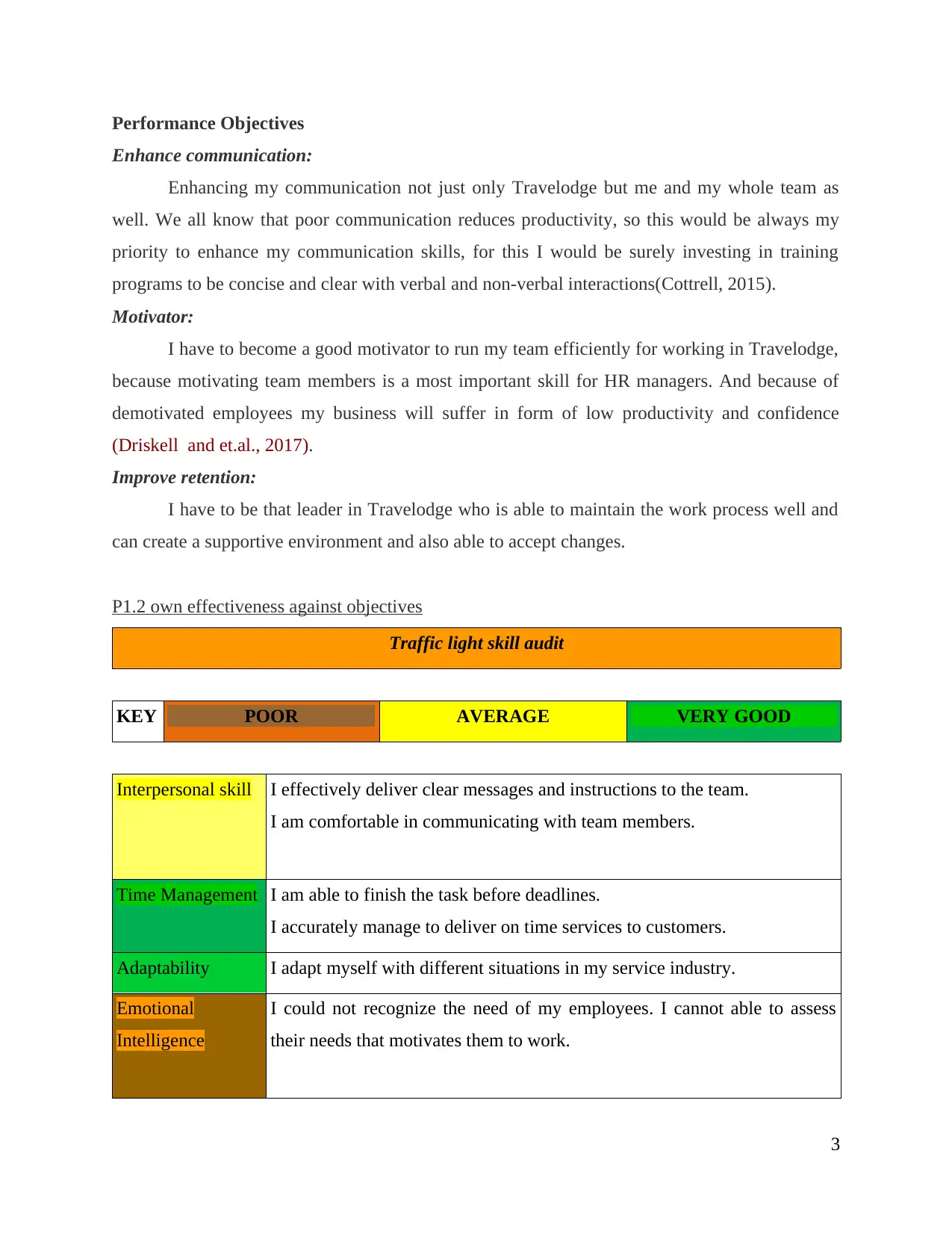
Performance Objectives
Enhance communication:
Enhancing my communication not just only Travelodge but me and my whole team as
well. We all know that poor communication reduces productivity, so this would be always my
priority to enhance my communication skills, for this I would be surely investing in training
programs to be concise and clear with verbal and non-verbal interactions(Cottrell, 2015).
Motivator:
I have to become a good motivator to run my team efficiently for working in Travelodge,
because motivating team members is a most important skill for HR managers. And because of
demotivated employees my business will suffer in form of low productivity and confidence
(Driskell and et.al., 2017).
Improve retention:
I have to be that leader in Travelodge who is able to maintain the work process well and
can create a supportive environment and also able to accept changes.
P1.2 own effectiveness against objectives
Traffic light skill audit
KEY POOR AVERAGE VERY GOOD
Interpersonal skill I effectively deliver clear messages and instructions to the team.
I am comfortable in communicating with team members.
Time Management I am able to finish the task before deadlines.
I accurately manage to deliver on time services to customers.
Adaptability I adapt myself with different situations in my service industry.
Emotional
Intelligence
I could not recognize the need of my employees. I cannot able to assess
their needs that motivates them to work.
3
Enhance communication:
Enhancing my communication not just only Travelodge but me and my whole team as
well. We all know that poor communication reduces productivity, so this would be always my
priority to enhance my communication skills, for this I would be surely investing in training
programs to be concise and clear with verbal and non-verbal interactions(Cottrell, 2015).
Motivator:
I have to become a good motivator to run my team efficiently for working in Travelodge,
because motivating team members is a most important skill for HR managers. And because of
demotivated employees my business will suffer in form of low productivity and confidence
(Driskell and et.al., 2017).
Improve retention:
I have to be that leader in Travelodge who is able to maintain the work process well and
can create a supportive environment and also able to accept changes.
P1.2 own effectiveness against objectives
Traffic light skill audit
KEY POOR AVERAGE VERY GOOD
Interpersonal skill I effectively deliver clear messages and instructions to the team.
I am comfortable in communicating with team members.
Time Management I am able to finish the task before deadlines.
I accurately manage to deliver on time services to customers.
Adaptability I adapt myself with different situations in my service industry.
Emotional
Intelligence
I could not recognize the need of my employees. I cannot able to assess
their needs that motivates them to work.
3
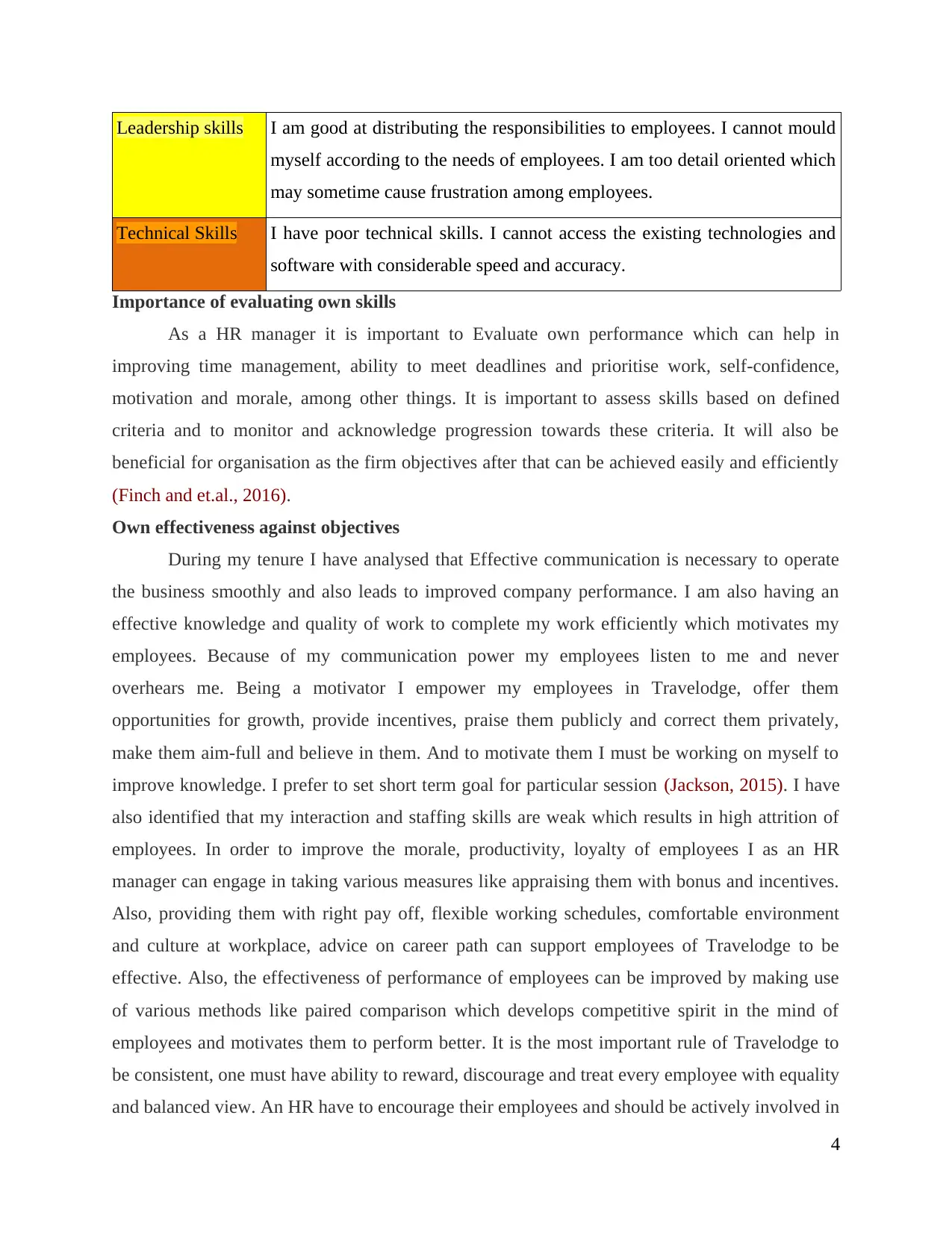
Leadership skills I am good at distributing the responsibilities to employees. I cannot mould
myself according to the needs of employees. I am too detail oriented which
may sometime cause frustration among employees.
Technical Skills I have poor technical skills. I cannot access the existing technologies and
software with considerable speed and accuracy.
Importance of evaluating own skills
As a HR manager it is important to Evaluate own performance which can help in
improving time management, ability to meet deadlines and prioritise work, self-confidence,
motivation and morale, among other things. It is important to assess skills based on defined
criteria and to monitor and acknowledge progression towards these criteria. It will also be
beneficial for organisation as the firm objectives after that can be achieved easily and efficiently
(Finch and et.al., 2016).
Own effectiveness against objectives
During my tenure I have analysed that Effective communication is necessary to operate
the business smoothly and also leads to improved company performance. I am also having an
effective knowledge and quality of work to complete my work efficiently which motivates my
employees. Because of my communication power my employees listen to me and never
overhears me. Being a motivator I empower my employees in Travelodge, offer them
opportunities for growth, provide incentives, praise them publicly and correct them privately,
make them aim-full and believe in them. And to motivate them I must be working on myself to
improve knowledge. I prefer to set short term goal for particular session (Jackson, 2015). I have
also identified that my interaction and staffing skills are weak which results in high attrition of
employees. In order to improve the morale, productivity, loyalty of employees I as an HR
manager can engage in taking various measures like appraising them with bonus and incentives.
Also, providing them with right pay off, flexible working schedules, comfortable environment
and culture at workplace, advice on career path can support employees of Travelodge to be
effective. Also, the effectiveness of performance of employees can be improved by making use
of various methods like paired comparison which develops competitive spirit in the mind of
employees and motivates them to perform better. It is the most important rule of Travelodge to
be consistent, one must have ability to reward, discourage and treat every employee with equality
and balanced view. An HR have to encourage their employees and should be actively involved in
4
myself according to the needs of employees. I am too detail oriented which
may sometime cause frustration among employees.
Technical Skills I have poor technical skills. I cannot access the existing technologies and
software with considerable speed and accuracy.
Importance of evaluating own skills
As a HR manager it is important to Evaluate own performance which can help in
improving time management, ability to meet deadlines and prioritise work, self-confidence,
motivation and morale, among other things. It is important to assess skills based on defined
criteria and to monitor and acknowledge progression towards these criteria. It will also be
beneficial for organisation as the firm objectives after that can be achieved easily and efficiently
(Finch and et.al., 2016).
Own effectiveness against objectives
During my tenure I have analysed that Effective communication is necessary to operate
the business smoothly and also leads to improved company performance. I am also having an
effective knowledge and quality of work to complete my work efficiently which motivates my
employees. Because of my communication power my employees listen to me and never
overhears me. Being a motivator I empower my employees in Travelodge, offer them
opportunities for growth, provide incentives, praise them publicly and correct them privately,
make them aim-full and believe in them. And to motivate them I must be working on myself to
improve knowledge. I prefer to set short term goal for particular session (Jackson, 2015). I have
also identified that my interaction and staffing skills are weak which results in high attrition of
employees. In order to improve the morale, productivity, loyalty of employees I as an HR
manager can engage in taking various measures like appraising them with bonus and incentives.
Also, providing them with right pay off, flexible working schedules, comfortable environment
and culture at workplace, advice on career path can support employees of Travelodge to be
effective. Also, the effectiveness of performance of employees can be improved by making use
of various methods like paired comparison which develops competitive spirit in the mind of
employees and motivates them to perform better. It is the most important rule of Travelodge to
be consistent, one must have ability to reward, discourage and treat every employee with equality
and balanced view. An HR have to encourage their employees and should be actively involved in
4
⊘ This is a preview!⊘
Do you want full access?
Subscribe today to unlock all pages.

Trusted by 1+ million students worldwide
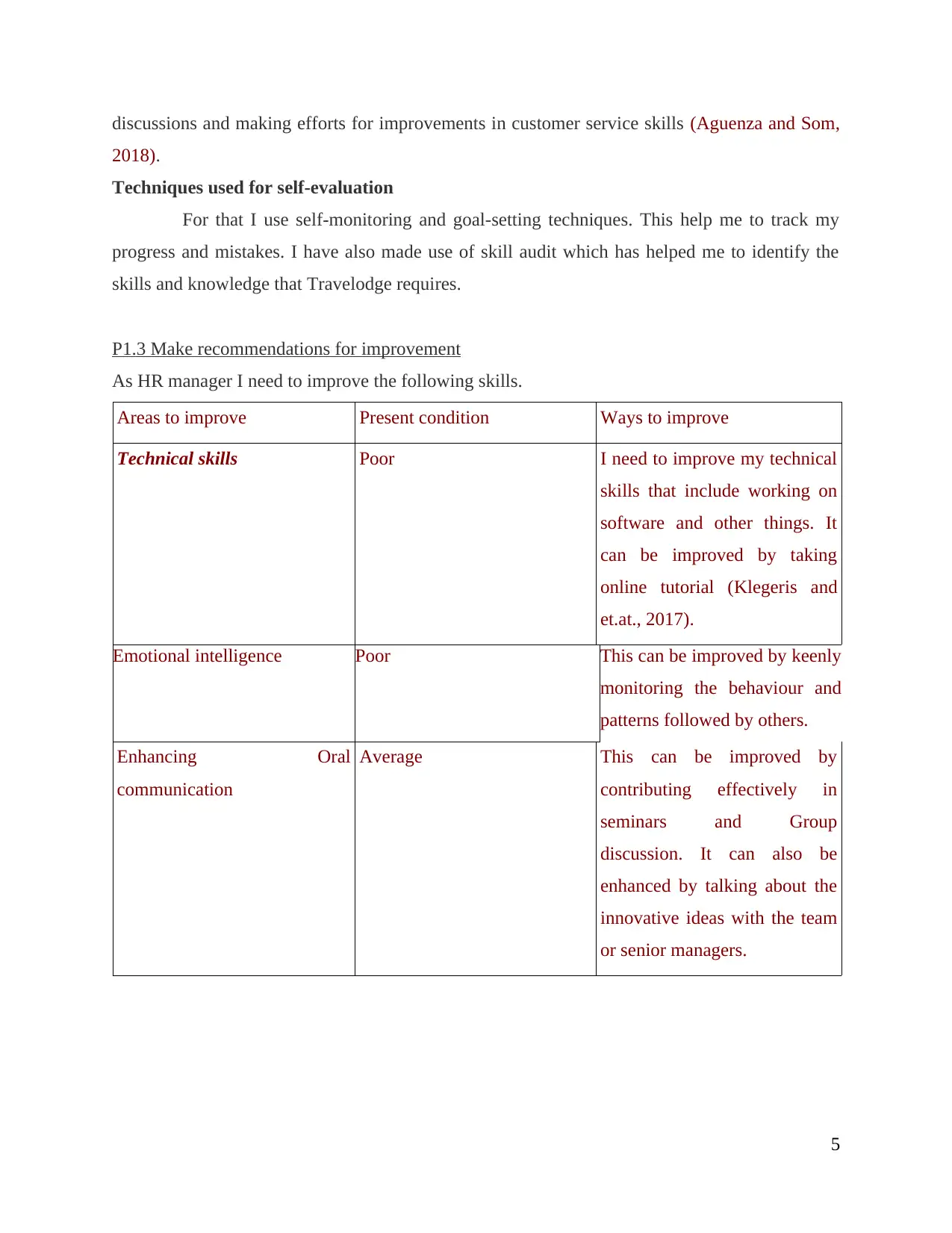
discussions and making efforts for improvements in customer service skills (Aguenza and Som,
2018).
Techniques used for self-evaluation
For that I use self-monitoring and goal-setting techniques. This help me to track my
progress and mistakes. I have also made use of skill audit which has helped me to identify the
skills and knowledge that Travelodge requires.
P1.3 Make recommendations for improvement
As HR manager I need to improve the following skills.
Areas to improve Present condition Ways to improve
Technical skills Poor I need to improve my technical
skills that include working on
software and other things. It
can be improved by taking
online tutorial (Klegeris and
et.at., 2017).
Emotional intelligence Poor This can be improved by keenly
monitoring the behaviour and
patterns followed by others.
Enhancing Oral
communication
Average This can be improved by
contributing effectively in
seminars and Group
discussion. It can also be
enhanced by talking about the
innovative ideas with the team
or senior managers.
5
2018).
Techniques used for self-evaluation
For that I use self-monitoring and goal-setting techniques. This help me to track my
progress and mistakes. I have also made use of skill audit which has helped me to identify the
skills and knowledge that Travelodge requires.
P1.3 Make recommendations for improvement
As HR manager I need to improve the following skills.
Areas to improve Present condition Ways to improve
Technical skills Poor I need to improve my technical
skills that include working on
software and other things. It
can be improved by taking
online tutorial (Klegeris and
et.at., 2017).
Emotional intelligence Poor This can be improved by keenly
monitoring the behaviour and
patterns followed by others.
Enhancing Oral
communication
Average This can be improved by
contributing effectively in
seminars and Group
discussion. It can also be
enhanced by talking about the
innovative ideas with the team
or senior managers.
5
Paraphrase This Document
Need a fresh take? Get an instant paraphrase of this document with our AI Paraphraser
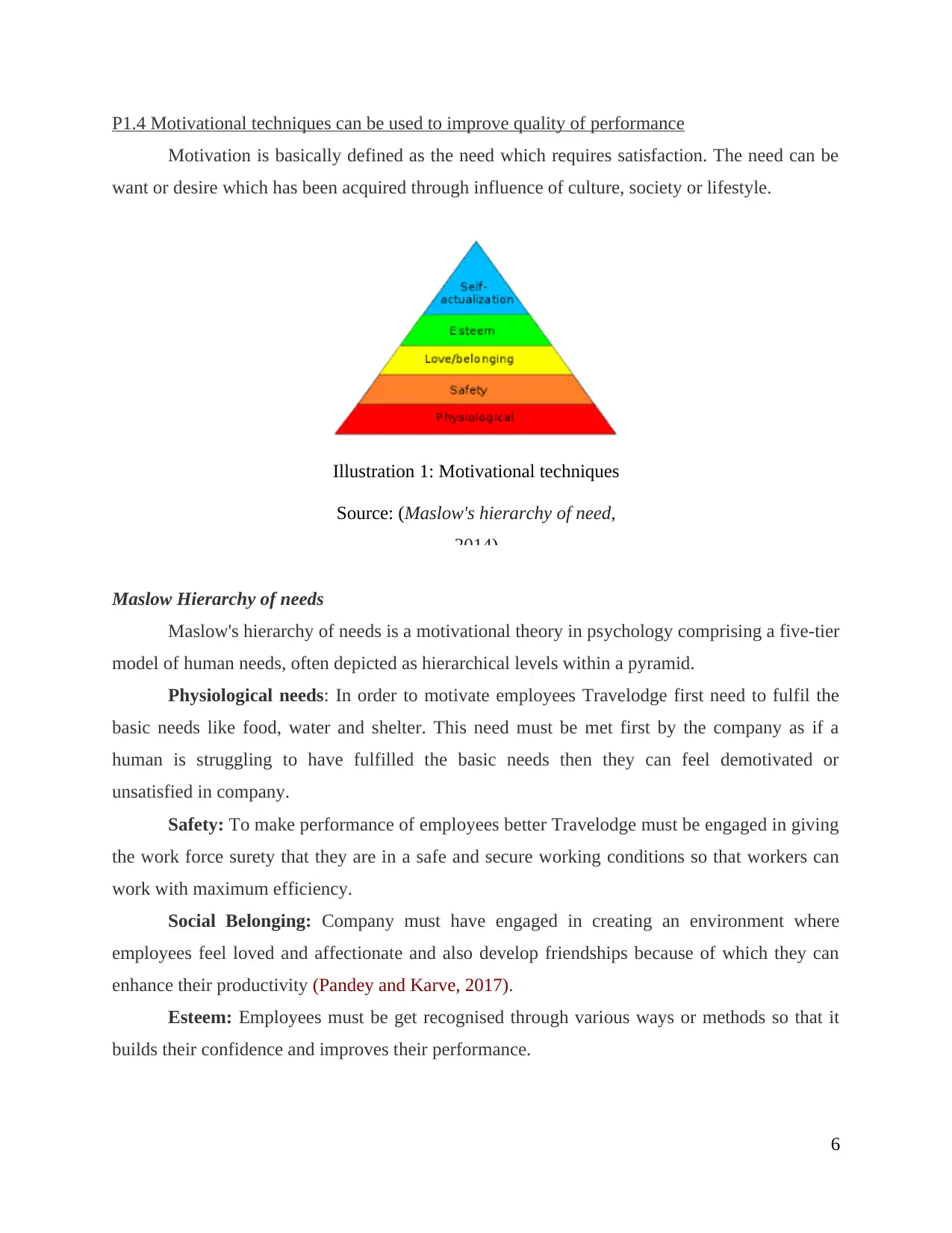
P1.4 Motivational techniques can be used to improve quality of performance
Motivation is basically defined as the need which requires satisfaction. The need can be
want or desire which has been acquired through influence of culture, society or lifestyle.
Maslow Hierarchy of needs
Maslow's hierarchy of needs is a motivational theory in psychology comprising a five-tier
model of human needs, often depicted as hierarchical levels within a pyramid.
Physiological needs: In order to motivate employees Travelodge first need to fulfil the
basic needs like food, water and shelter. This need must be met first by the company as if a
human is struggling to have fulfilled the basic needs then they can feel demotivated or
unsatisfied in company.
Safety: To make performance of employees better Travelodge must be engaged in giving
the work force surety that they are in a safe and secure working conditions so that workers can
work with maximum efficiency.
Social Belonging: Company must have engaged in creating an environment where
employees feel loved and affectionate and also develop friendships because of which they can
enhance their productivity (Pandey and Karve, 2017).
Esteem: Employees must be get recognised through various ways or methods so that it
builds their confidence and improves their performance.
6
Illustration 1: Motivational techniques
Source: (Maslow's hierarchy of need,
2014)
Motivation is basically defined as the need which requires satisfaction. The need can be
want or desire which has been acquired through influence of culture, society or lifestyle.
Maslow Hierarchy of needs
Maslow's hierarchy of needs is a motivational theory in psychology comprising a five-tier
model of human needs, often depicted as hierarchical levels within a pyramid.
Physiological needs: In order to motivate employees Travelodge first need to fulfil the
basic needs like food, water and shelter. This need must be met first by the company as if a
human is struggling to have fulfilled the basic needs then they can feel demotivated or
unsatisfied in company.
Safety: To make performance of employees better Travelodge must be engaged in giving
the work force surety that they are in a safe and secure working conditions so that workers can
work with maximum efficiency.
Social Belonging: Company must have engaged in creating an environment where
employees feel loved and affectionate and also develop friendships because of which they can
enhance their productivity (Pandey and Karve, 2017).
Esteem: Employees must be get recognised through various ways or methods so that it
builds their confidence and improves their performance.
6
Illustration 1: Motivational techniques
Source: (Maslow's hierarchy of need,
2014)
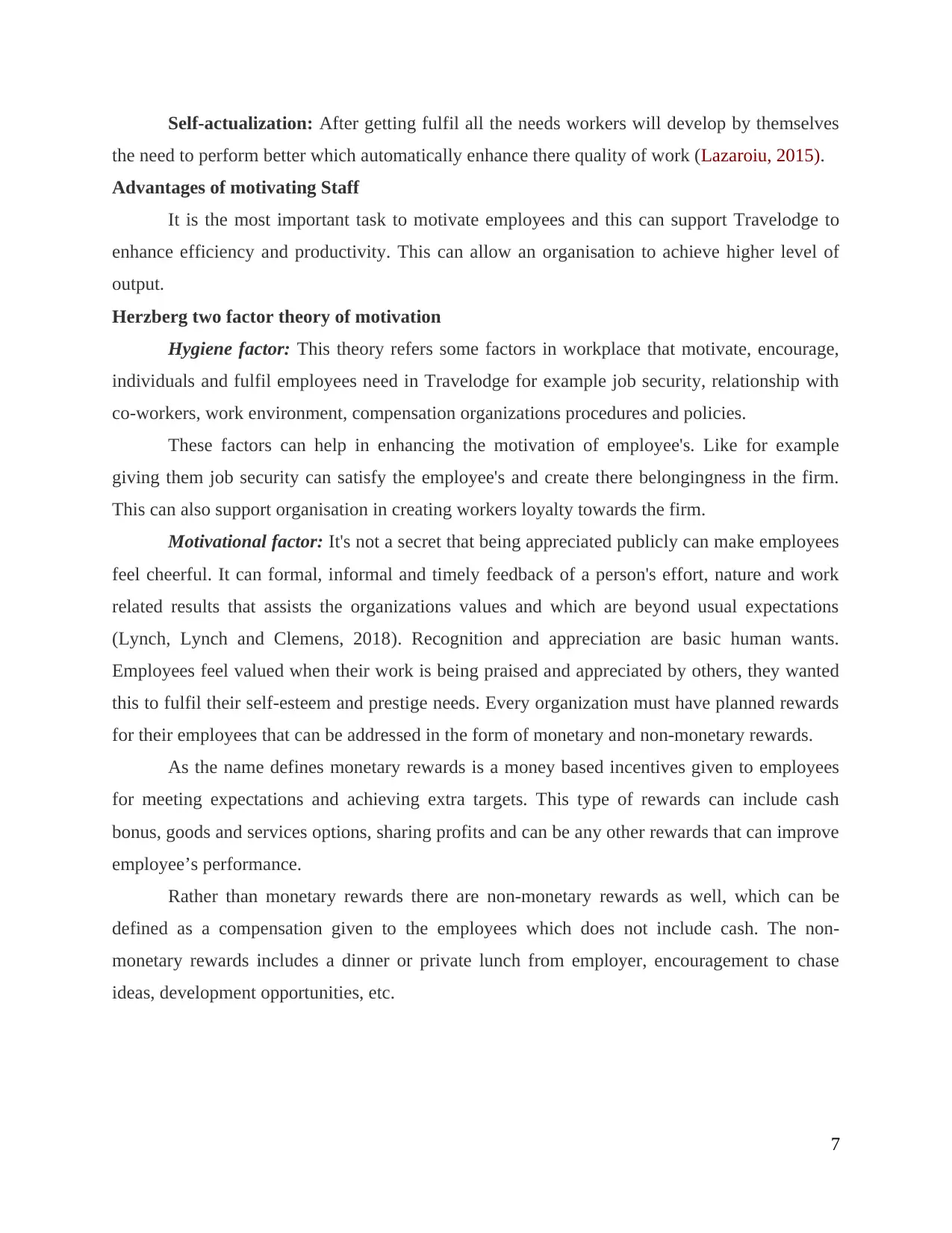
Self-actualization: After getting fulfil all the needs workers will develop by themselves
the need to perform better which automatically enhance there quality of work (Lazaroiu, 2015).
Advantages of motivating Staff
It is the most important task to motivate employees and this can support Travelodge to
enhance efficiency and productivity. This can allow an organisation to achieve higher level of
output.
Herzberg two factor theory of motivation
Hygiene factor: This theory refers some factors in workplace that motivate, encourage,
individuals and fulfil employees need in Travelodge for example job security, relationship with
co-workers, work environment, compensation organizations procedures and policies.
These factors can help in enhancing the motivation of employee's. Like for example
giving them job security can satisfy the employee's and create there belongingness in the firm.
This can also support organisation in creating workers loyalty towards the firm.
Motivational factor: It's not a secret that being appreciated publicly can make employees
feel cheerful. It can formal, informal and timely feedback of a person's effort, nature and work
related results that assists the organizations values and which are beyond usual expectations
(Lynch, Lynch and Clemens, 2018). Recognition and appreciation are basic human wants.
Employees feel valued when their work is being praised and appreciated by others, they wanted
this to fulfil their self-esteem and prestige needs. Every organization must have planned rewards
for their employees that can be addressed in the form of monetary and non-monetary rewards.
As the name defines monetary rewards is a money based incentives given to employees
for meeting expectations and achieving extra targets. This type of rewards can include cash
bonus, goods and services options, sharing profits and can be any other rewards that can improve
employee’s performance.
Rather than monetary rewards there are non-monetary rewards as well, which can be
defined as a compensation given to the employees which does not include cash. The non-
monetary rewards includes a dinner or private lunch from employer, encouragement to chase
ideas, development opportunities, etc.
7
the need to perform better which automatically enhance there quality of work (Lazaroiu, 2015).
Advantages of motivating Staff
It is the most important task to motivate employees and this can support Travelodge to
enhance efficiency and productivity. This can allow an organisation to achieve higher level of
output.
Herzberg two factor theory of motivation
Hygiene factor: This theory refers some factors in workplace that motivate, encourage,
individuals and fulfil employees need in Travelodge for example job security, relationship with
co-workers, work environment, compensation organizations procedures and policies.
These factors can help in enhancing the motivation of employee's. Like for example
giving them job security can satisfy the employee's and create there belongingness in the firm.
This can also support organisation in creating workers loyalty towards the firm.
Motivational factor: It's not a secret that being appreciated publicly can make employees
feel cheerful. It can formal, informal and timely feedback of a person's effort, nature and work
related results that assists the organizations values and which are beyond usual expectations
(Lynch, Lynch and Clemens, 2018). Recognition and appreciation are basic human wants.
Employees feel valued when their work is being praised and appreciated by others, they wanted
this to fulfil their self-esteem and prestige needs. Every organization must have planned rewards
for their employees that can be addressed in the form of monetary and non-monetary rewards.
As the name defines monetary rewards is a money based incentives given to employees
for meeting expectations and achieving extra targets. This type of rewards can include cash
bonus, goods and services options, sharing profits and can be any other rewards that can improve
employee’s performance.
Rather than monetary rewards there are non-monetary rewards as well, which can be
defined as a compensation given to the employees which does not include cash. The non-
monetary rewards includes a dinner or private lunch from employer, encouragement to chase
ideas, development opportunities, etc.
7
⊘ This is a preview!⊘
Do you want full access?
Subscribe today to unlock all pages.

Trusted by 1+ million students worldwide
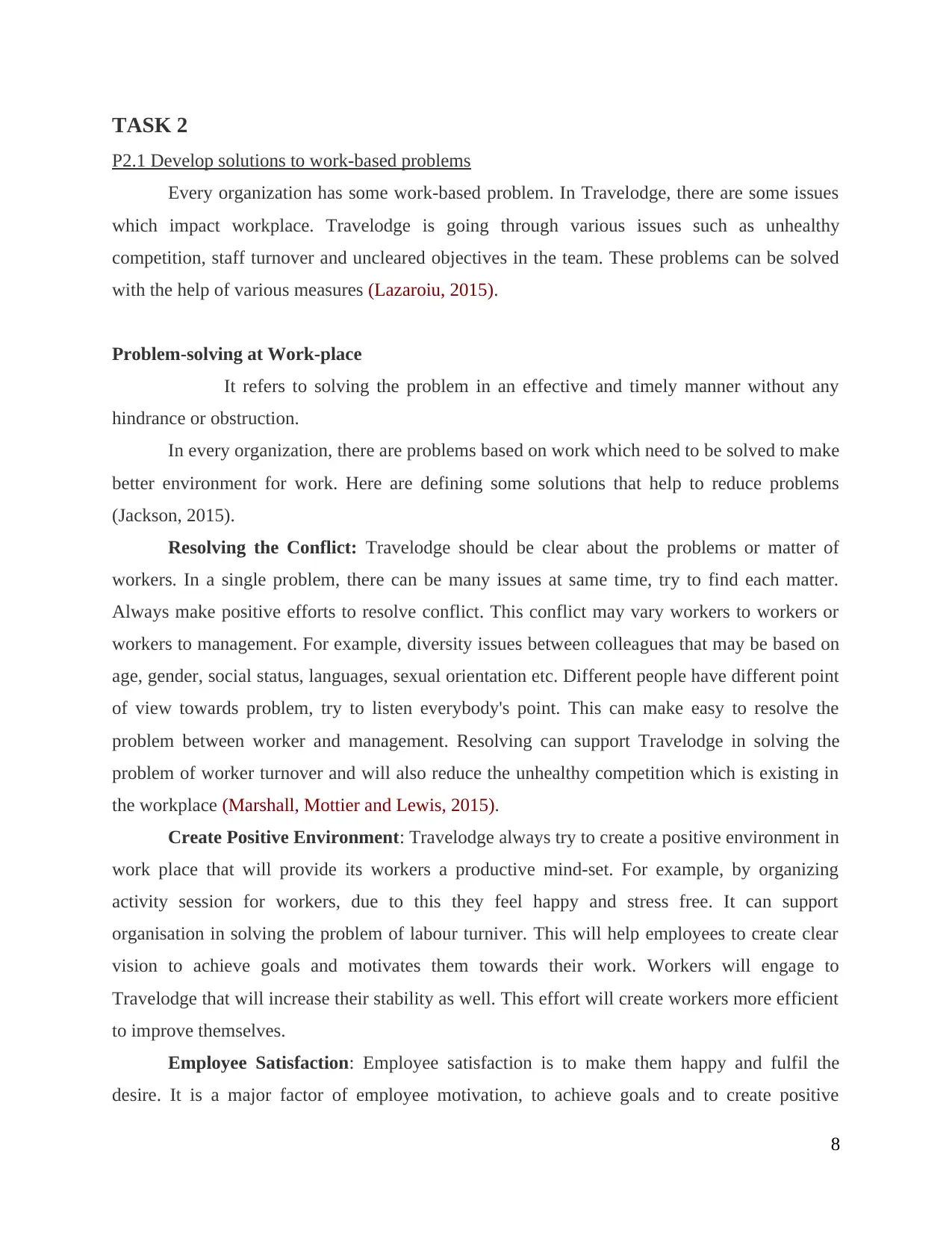
TASK 2
P2.1 Develop solutions to work-based problems
Every organization has some work-based problem. In Travelodge, there are some issues
which impact workplace. Travelodge is going through various issues such as unhealthy
competition, staff turnover and uncleared objectives in the team. These problems can be solved
with the help of various measures (Lazaroiu, 2015).
Problem-solving at Work-place
It refers to solving the problem in an effective and timely manner without any
hindrance or obstruction.
In every organization, there are problems based on work which need to be solved to make
better environment for work. Here are defining some solutions that help to reduce problems
(Jackson, 2015).
Resolving the Conflict: Travelodge should be clear about the problems or matter of
workers. In a single problem, there can be many issues at same time, try to find each matter.
Always make positive efforts to resolve conflict. This conflict may vary workers to workers or
workers to management. For example, diversity issues between colleagues that may be based on
age, gender, social status, languages, sexual orientation etc. Different people have different point
of view towards problem, try to listen everybody's point. This can make easy to resolve the
problem between worker and management. Resolving can support Travelodge in solving the
problem of worker turnover and will also reduce the unhealthy competition which is existing in
the workplace (Marshall, Mottier and Lewis, 2015).
Create Positive Environment: Travelodge always try to create a positive environment in
work place that will provide its workers a productive mind-set. For example, by organizing
activity session for workers, due to this they feel happy and stress free. It can support
organisation in solving the problem of labour turniver. This will help employees to create clear
vision to achieve goals and motivates them towards their work. Workers will engage to
Travelodge that will increase their stability as well. This effort will create workers more efficient
to improve themselves.
Employee Satisfaction: Employee satisfaction is to make them happy and fulfil the
desire. It is a major factor of employee motivation, to achieve goals and to create positive
8
P2.1 Develop solutions to work-based problems
Every organization has some work-based problem. In Travelodge, there are some issues
which impact workplace. Travelodge is going through various issues such as unhealthy
competition, staff turnover and uncleared objectives in the team. These problems can be solved
with the help of various measures (Lazaroiu, 2015).
Problem-solving at Work-place
It refers to solving the problem in an effective and timely manner without any
hindrance or obstruction.
In every organization, there are problems based on work which need to be solved to make
better environment for work. Here are defining some solutions that help to reduce problems
(Jackson, 2015).
Resolving the Conflict: Travelodge should be clear about the problems or matter of
workers. In a single problem, there can be many issues at same time, try to find each matter.
Always make positive efforts to resolve conflict. This conflict may vary workers to workers or
workers to management. For example, diversity issues between colleagues that may be based on
age, gender, social status, languages, sexual orientation etc. Different people have different point
of view towards problem, try to listen everybody's point. This can make easy to resolve the
problem between worker and management. Resolving can support Travelodge in solving the
problem of worker turnover and will also reduce the unhealthy competition which is existing in
the workplace (Marshall, Mottier and Lewis, 2015).
Create Positive Environment: Travelodge always try to create a positive environment in
work place that will provide its workers a productive mind-set. For example, by organizing
activity session for workers, due to this they feel happy and stress free. It can support
organisation in solving the problem of labour turniver. This will help employees to create clear
vision to achieve goals and motivates them towards their work. Workers will engage to
Travelodge that will increase their stability as well. This effort will create workers more efficient
to improve themselves.
Employee Satisfaction: Employee satisfaction is to make them happy and fulfil the
desire. It is a major factor of employee motivation, to achieve goals and to create positive
8
Paraphrase This Document
Need a fresh take? Get an instant paraphrase of this document with our AI Paraphraser
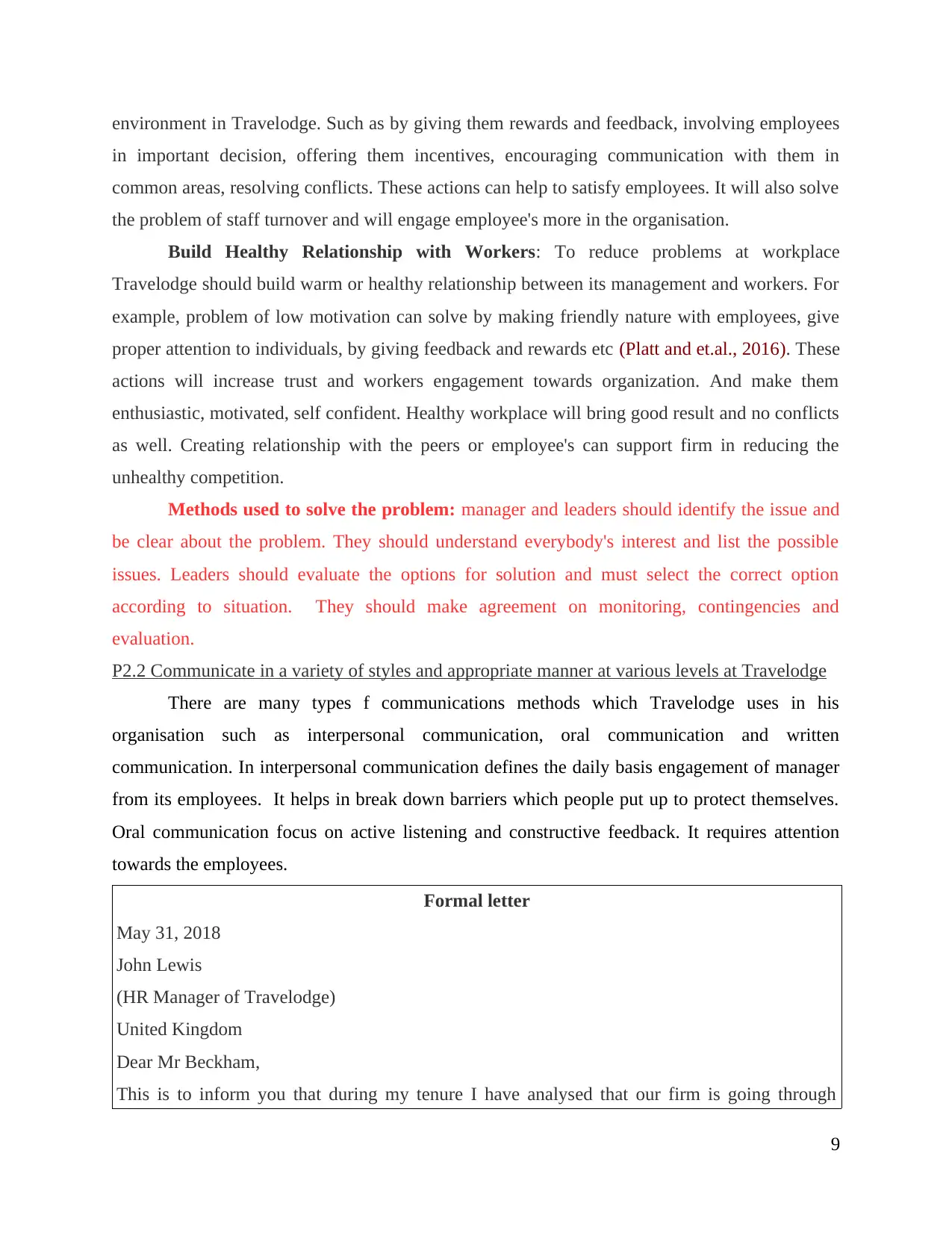
environment in Travelodge. Such as by giving them rewards and feedback, involving employees
in important decision, offering them incentives, encouraging communication with them in
common areas, resolving conflicts. These actions can help to satisfy employees. It will also solve
the problem of staff turnover and will engage employee's more in the organisation.
Build Healthy Relationship with Workers: To reduce problems at workplace
Travelodge should build warm or healthy relationship between its management and workers. For
example, problem of low motivation can solve by making friendly nature with employees, give
proper attention to individuals, by giving feedback and rewards etc (Platt and et.al., 2016). These
actions will increase trust and workers engagement towards organization. And make them
enthusiastic, motivated, self confident. Healthy workplace will bring good result and no conflicts
as well. Creating relationship with the peers or employee's can support firm in reducing the
unhealthy competition.
Methods used to solve the problem: manager and leaders should identify the issue and
be clear about the problem. They should understand everybody's interest and list the possible
issues. Leaders should evaluate the options for solution and must select the correct option
according to situation. They should make agreement on monitoring, contingencies and
evaluation.
P2.2 Communicate in a variety of styles and appropriate manner at various levels at Travelodge
There are many types f communications methods which Travelodge uses in his
organisation such as interpersonal communication, oral communication and written
communication. In interpersonal communication defines the daily basis engagement of manager
from its employees. It helps in break down barriers which people put up to protect themselves.
Oral communication focus on active listening and constructive feedback. It requires attention
towards the employees.
Formal letter
May 31, 2018
John Lewis
(HR Manager of Travelodge)
United Kingdom
Dear Mr Beckham,
This is to inform you that during my tenure I have analysed that our firm is going through
9
in important decision, offering them incentives, encouraging communication with them in
common areas, resolving conflicts. These actions can help to satisfy employees. It will also solve
the problem of staff turnover and will engage employee's more in the organisation.
Build Healthy Relationship with Workers: To reduce problems at workplace
Travelodge should build warm or healthy relationship between its management and workers. For
example, problem of low motivation can solve by making friendly nature with employees, give
proper attention to individuals, by giving feedback and rewards etc (Platt and et.al., 2016). These
actions will increase trust and workers engagement towards organization. And make them
enthusiastic, motivated, self confident. Healthy workplace will bring good result and no conflicts
as well. Creating relationship with the peers or employee's can support firm in reducing the
unhealthy competition.
Methods used to solve the problem: manager and leaders should identify the issue and
be clear about the problem. They should understand everybody's interest and list the possible
issues. Leaders should evaluate the options for solution and must select the correct option
according to situation. They should make agreement on monitoring, contingencies and
evaluation.
P2.2 Communicate in a variety of styles and appropriate manner at various levels at Travelodge
There are many types f communications methods which Travelodge uses in his
organisation such as interpersonal communication, oral communication and written
communication. In interpersonal communication defines the daily basis engagement of manager
from its employees. It helps in break down barriers which people put up to protect themselves.
Oral communication focus on active listening and constructive feedback. It requires attention
towards the employees.
Formal letter
May 31, 2018
John Lewis
(HR Manager of Travelodge)
United Kingdom
Dear Mr Beckham,
This is to inform you that during my tenure I have analysed that our firm is going through
9
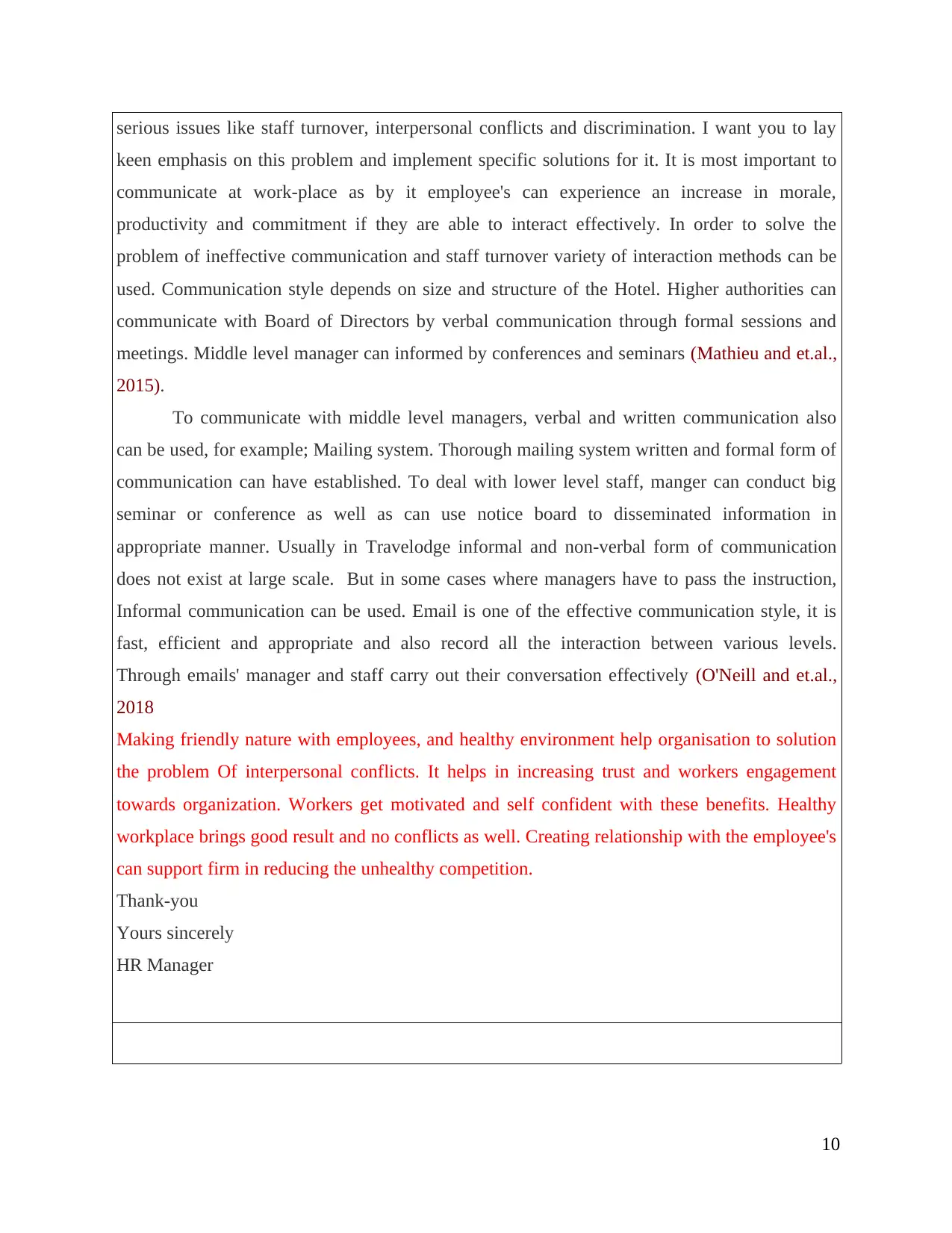
serious issues like staff turnover, interpersonal conflicts and discrimination. I want you to lay
keen emphasis on this problem and implement specific solutions for it. It is most important to
communicate at work-place as by it employee's can experience an increase in morale,
productivity and commitment if they are able to interact effectively. In order to solve the
problem of ineffective communication and staff turnover variety of interaction methods can be
used. Communication style depends on size and structure of the Hotel. Higher authorities can
communicate with Board of Directors by verbal communication through formal sessions and
meetings. Middle level manager can informed by conferences and seminars (Mathieu and et.al.,
2015).
To communicate with middle level managers, verbal and written communication also
can be used, for example; Mailing system. Thorough mailing system written and formal form of
communication can have established. To deal with lower level staff, manger can conduct big
seminar or conference as well as can use notice board to disseminated information in
appropriate manner. Usually in Travelodge informal and non-verbal form of communication
does not exist at large scale. But in some cases where managers have to pass the instruction,
Informal communication can be used. Email is one of the effective communication style, it is
fast, efficient and appropriate and also record all the interaction between various levels.
Through emails' manager and staff carry out their conversation effectively (O'Neill and et.al.,
2018
Making friendly nature with employees, and healthy environment help organisation to solution
the problem Of interpersonal conflicts. It helps in increasing trust and workers engagement
towards organization. Workers get motivated and self confident with these benefits. Healthy
workplace brings good result and no conflicts as well. Creating relationship with the employee's
can support firm in reducing the unhealthy competition.
Thank-you
Yours sincerely
HR Manager
10
keen emphasis on this problem and implement specific solutions for it. It is most important to
communicate at work-place as by it employee's can experience an increase in morale,
productivity and commitment if they are able to interact effectively. In order to solve the
problem of ineffective communication and staff turnover variety of interaction methods can be
used. Communication style depends on size and structure of the Hotel. Higher authorities can
communicate with Board of Directors by verbal communication through formal sessions and
meetings. Middle level manager can informed by conferences and seminars (Mathieu and et.al.,
2015).
To communicate with middle level managers, verbal and written communication also
can be used, for example; Mailing system. Thorough mailing system written and formal form of
communication can have established. To deal with lower level staff, manger can conduct big
seminar or conference as well as can use notice board to disseminated information in
appropriate manner. Usually in Travelodge informal and non-verbal form of communication
does not exist at large scale. But in some cases where managers have to pass the instruction,
Informal communication can be used. Email is one of the effective communication style, it is
fast, efficient and appropriate and also record all the interaction between various levels.
Through emails' manager and staff carry out their conversation effectively (O'Neill and et.al.,
2018
Making friendly nature with employees, and healthy environment help organisation to solution
the problem Of interpersonal conflicts. It helps in increasing trust and workers engagement
towards organization. Workers get motivated and self confident with these benefits. Healthy
workplace brings good result and no conflicts as well. Creating relationship with the employee's
can support firm in reducing the unhealthy competition.
Thank-you
Yours sincerely
HR Manager
10
⊘ This is a preview!⊘
Do you want full access?
Subscribe today to unlock all pages.

Trusted by 1+ million students worldwide
1 out of 26
Related Documents
Your All-in-One AI-Powered Toolkit for Academic Success.
+13062052269
info@desklib.com
Available 24*7 on WhatsApp / Email
![[object Object]](/_next/static/media/star-bottom.7253800d.svg)
Unlock your academic potential
Copyright © 2020–2025 A2Z Services. All Rights Reserved. Developed and managed by ZUCOL.





